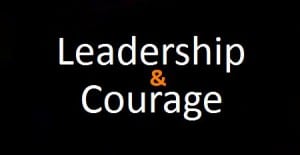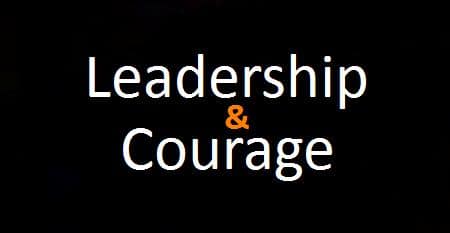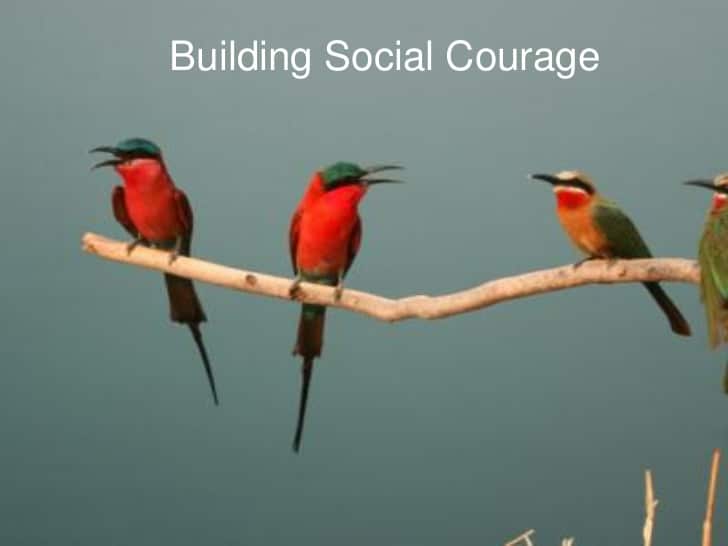 Why is courage important in leadership? This is a question posed by many leaders and organisations as they determine the importance of including courage as a vital attribute for their leaders of the future.
Why is courage important in leadership? This is a question posed by many leaders and organisations as they determine the importance of including courage as a vital attribute for their leaders of the future.
Our immediate response is that it is vital for organisations serious about disrupting the status quo and creating success in an uncertain, ambiguous, volatile and complex business environment that increasingly demands speed. Speed to respond, to take action, to make decisions, to create value and to engage in constructive and meaningful ways with all the critical stakeholders in their business and personal lives.
When you accept business leaders bring 6 types of courage to the way they lead themselves, others and the business you can begin to “see” why courage is so important as we forge our way through the business world to create sustainable success:
PHYSICAL COURAGE
This is the type of courage many of us think of first – it is the bravery when faced with the risk of bodily harm or death and involves developing physical strength, resiliency, and awareness – examples of this kind of courage are running into burning buildings as a firefighter, facing an enemy on the battlefield, undergoing chemotherapy, climbing a mountain. Although many leaders invite their colleagues into demonstrating this kind of courage in “team building” activities – in our experience it is not the most needed type of courage within most businesses.
2. SOCIAL COURAGE
Social courage is about standing up tall, being able to greet the world with your head held high, feeling comfortable in your own skin. Social courage means not conforming to the expectations of others, being willing to show your true self even if it means risking social disapproval or retribution. It means being able to express opinions and thoughts without checking to see if they are in line with “everyone else’s” opinions and thoughts. In our experience, this is one of the most challenging types of courage for individual leaders to demonstrate – as they don’t want to be “the one” to rock the boat and break ranks with the comfortable way they have built to relate with each other.
3. MORAL COURAGE
Moral courage is about doing the right thing even at the risk of inconvenience, ridicule, retribution, loss of job or security or social status. Moral courage requires us to rise above the apathy, complacency, hatred, cynicism, and fear-mongering in our political systems, organisational cultures, socioeconomic divisions, and cultural/religious differences. Doing the right thing means listening to our conscience; the quiet voice within. Ignoring that voice can lead to feelings of inadequacy, guilt, and diminished personal integrity. Moral courage requires us to make judgments about what actions or behaviours are supportive of being ideal self, and which ones are destructive. It asks us to recognize our responsibilities and see the consequences of our actions and choices.
4. EMOTIONAL COURAGE
This type of courage is about being open to feeling the full spectrum of emotional experience, both positive and negative. The most universal are happiness, sadness, anger, fear, and disgust. All are associated with biological intelligence and a drive to survive. Emotional courage is about being willing to be vulnerable, truthful, and aware of your conscious experience of these core emotions. Emotional courage also means loving yourself, being proud of yourself, and believing that you are worthy of love and happiness. Essentially, it is related to self-acceptance, coupled with a willingness to move outside your comfort zone. In our experience many business leaders fear demonstrating this courage more than physical courage – give me a 50-metre wall to abseil down rather than ask me to make myself vulnerable by sharing how I feel and listening to others share how they feel.
5. INTELLECTUAL COURAGE
Intellectual courage means being willing to grapple with difficult or confusing concepts, ask questions, struggle to gain understanding and risk making mistakes. Sometimes what we learn challenges previously accepted ideas, or contradicts earlier teachings. Intellectual courage will be required more and more in the future, as complex structural problems of the environment, economy, and society challenge conventional problem-solving. Intellectual courage means being intrinsically motivated to learn and question. Integrity and authenticity are interwoven with intellectual courage; it means telling the truth no matter how uncomfortable.
6. SPIRITUAL COURAGE
Spiritual courage means being available to the deepest questions about why we are here, what is my life for, do I have a purpose? These are profound existential questions and can be quite frightening, which suggests why fundamentalism of all kinds can gain mastery over us. Spiritual courage means accepting you are unlikely to find answers, but asking the questions anyway. We all call upon spiritual courage when we consider our own mortality. Spiritual courage means opening ourselves up to our own vulnerability and the mysteries of life.
Courage is at the very essence of being authentic and developing trust in you and where you are taking the business – vitally important to the long-term and sustainable success of any business and leader. Courage enables the speed being sought – sharing what we really think and feel and listening as others share with us.








